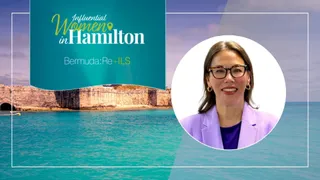
Influential Women in Hamilton: Sylvia Oliveira
Sylvia Oliveira is chair and CEO of Wilton Re Bermuda, as well as CRO for the Wilton Re group, where she implements and oversees the global ERM framework. She has more than 30 years’ industry experience, across a broad range of life insurance and reinsurance product lines.
How did it feel to be named Woman of the Year 2025 by Women in Reinsurance Bermuda?
Incredibly humbling. Being recognised in an industry I care greatly about was an honour. My colleagues, friends across Bermuda’s reinsurance market and family have all played a part.
It made me feel especially grateful to my mother, Eva Martin, who taught me to be brave, keep learning and persist no matter what. Accepting this award felt like honouring her – and the legacy of women who paved the way.
What key moments or decisions led to this recognition?
It reflects 25 years of advocating for Bermuda’s life reinsurance industry – championing a strong regulatory framework and protecting Bermuda’s reputation. My board positions on BILTIR and ABIC let me advocate for the sector and create opportunities for young Bermudians.
Another milestone was establishing the Actuaries of Bermuda association, which I founded to bring together one of the world’s highest per-capita populations of actuaries.
How do you define success?
Early on, I defined success through achievement – passing actuarial exams, promotions, hitting targets.
Now, success is about impact: leaving the business stronger, opening doors for others and ensuring my work reflects my values. It’s not about my accomplishments but the opportunities I create for others.
How do you use your influence to challenge industry norms and accelerate progress?
Influence is only valuable if put to work in speaking up even when it’s uncomfortable, especially on diversity, governance and the industry’s health.
Accelerating progress requires concrete actions. I focus on shifting the dialogue from “why diversity matters” to “how we operationalise it” – embedding it into hiring practices, mentorship programmes and succession planning.
Acceleration is widening the circle of contributors. I try to create seats at the table for voices that aren’t always heard.
What’s one “uncomfortable truth” about leadership rarely spoken about?
Sadly, credibility is not always granted where deserved. I still experience men speaking over me in meetings or directing their comments to my male junior colleagues. I have learned to establish credibility quickly, but it’s exhausting to do it repeatedly.
How do you identify and nurture future leaders? What traits matter more than credentials?
Curiosity, resilience and the ability to connect. Technical skills can be taught – integrity, empathy and willingness to take ownership cannot.
One example stands out: a young actuarial student joined as an intern. They were impressive on paper, but what struck me was how they asked thoughtful questions, admitted when they didn’t know something and came back having done research. That humility and initiative show leadership potential.
Nurturing leaders is about giving space to stretch and supporting when they stumble. I aim to build teams that can lead with competence and heart.
What are the most pressing challenges young professionals are facing in re/insurance?
Balancing rapid technological change with the human skills essential in our industry. AI, automation and data analytics are transforming how we work, but trust, judgment and relationship-building will always matter.
What belief held early in your career have you since outgrown?
Early on, I thought of leadership as the conventional old-school approach – structured, focused on command and control.
Over time, I learned the most effective leadership comes from authenticity, empathy and vulnerability. When I began leading in a way that reflected my values – building trust, listening deeply, and being human – my teams grew stronger.
Real leadership power lies in creating an environment where people feel supported and challenged.
If your younger self could shadow you today, what would surprise her?
She would be astonished to see me in so many leadership roles. I was a shy child. I didn’t imagine speaking on stages or leading teams. I just put my hand up for leadership roles when I believed in the cause, even when it felt uncomfortable. Leadership is not about being the loudest – it’s about raising my hand, taking responsibility and making a commitment.
“If people I’ve worked with feel I invested in their growth and created opportunities for them, that will be my most important legacy.”
What legacy do you hope to leave?
I hope for a strong, forward-looking leadership team and a culture that values excellence and humanity. For Bermuda, I hope I have opened doors for local talent.
I hope my example shows leadership can be ambitious and inclusive – it is possible to succeed while staying true to your values, supporting others and contributing to the community.
If people I’ve worked with feel I invested in their growth and created opportunities for them, that will be my most important legacy.
Did you get value from this story? Sign up to our free daily newsletters and get stories like this sent straight to your inbox.

